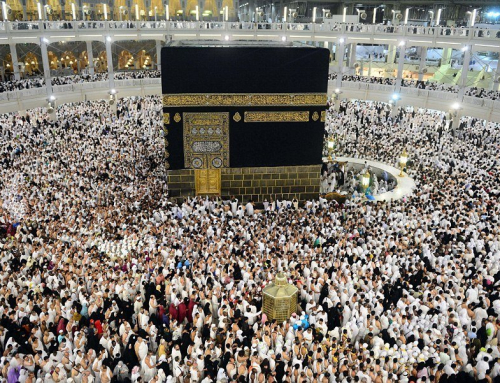Nadia Yassine
May 26, 2013
From theory to theory, from philosophy to philosophy, we come now to examine a global phenomenon that we call a “deed,” although “submission” better suits it. The Encyclopedia Universalis defines globalization as follows:
Globalization, in the general sense of the word, is at once the process and the outcome of the process according to which phenomena of all types (economic, environmental, political, etc.) tend to assume a truly global dimension.)
The artful haziness of the definition is not a sign of slackening in the reliability attributed to this encyclopedia. The indecisiveness of the definition is caused by the very nature of the phenomenon. Globalization, the outcome of a multitude of factors that are perhaps interactive but not necessarily interdependent, does not easily lend itself to a precise definition. The definition is also difficult because the phenomenon varies according to the angle from which it is observed, the motivations (or motives) that urge us to analyze it, the country and hemisphere to which we belong, and the education we have received.
The other factor that makes it enigmatic to define globalization satisfactorily is the tremendous speed of its advance. We simply had not seen it coming. History, until recently, had the courtesy to allow us room to guess a forthcoming event, to apprehend it, to await it, to anticipate it—in short, it left time for time to unfold.
Thus we could describe a limited phase of its course as being an “event.” We used to take part, somehow or other, in its unfolding, having, if not the privilege to have control on it, at least the comforting illusion of doing so.
It did not matter whether we made the “deed” or it made us; the important thing was that we used to dwell in history: events did not completely escape our vigilance. We used to inhabit history, living in a natural connection with events, whether happy or not. The speed of globalization has deprived us of such a beneficial and comforting advantage.
We no longer inhabit history; we are history’s orphans. Inhabiting history meant being able to sketch an outline of the future and guide ourselves with a glance at the rearview mirror. Hence the other distinctive feature of globalization is its dangerous novelty. Such specificity makes our future impenetrable; our misted rearview mirror no longer serves us well. Godless man with his hypertrophied brain, history’s orphan, heedless of the future, fragmented in his mind, citizen of a bedlam: that is the one who is to face globalization. That is where our path has led us: a turbulent world that prevents us from thinking out our future in serenity. This chapter will examine the different facets of this perversion of meaning and, consequently, of the meaning which globalization imposes on us.
Complex and complicated, globalization requires a long reflection and solid references in the method chosen to investigate it. It is difficult for the hasty man, forged with the fire of the here and now and soaked in a sea of incertitudes, to take stock of such a disconcerting development. “Move along, there’s nothing to think about” is the appropriate motto of modernism! (1)
Profound reflection is chased out by the barrage of information that hammers at your door, plagues you all day long, pursues you, enters by the ears, exits through the eyes, endlessly harassing you. Serious calm reflection is an inconvenience in the era of information at any price—a very low price indeed.
Nevertheless, even those who resist the groundswell of easy, futile, and distorted nformation affirm that thinking through globalization is no easy matter.
Until recently, thinking through an event meant being in possession of thought processes enabling one to classify it, manage its premises, draw a lesson from it or, often, deduce the possibility or requirement of action.
Thinking means, to begin with, being able to conceptualize the facts. The complexity of globalization aggravates the particular handicap of the modernity’s “doxosophers.” (2)
Unable to form an overview of the situation, they content themselves with fashioning a atchwork of similarly vague concepts—all the more disconcerting for those who deign to search for the roots of events.
Surveying the field of the fragmented conceptual investigation, we easily note that this global phenomenon is discussed as a thing in itself that can only be subjectively defined. The phenomenon has caused a lot of ink to flow, and it is on the agenda of every reflection on the future of man. Economists call it “globalization.” Others prefer to speak of it in more elaborate terms, defining it, in Wolfram Eberhart’s phrase, as a “global era.” Still others define it as a “global break through,” (3) the new era where many data contribute to make it the “colossal event” that has the virtue of “bundling scattered phenomena together.” (4)
Some borrow from Karl Jaspers the idea that ours is a pivotal era, a transitional era like the first century B.C. The argument, intending to be comforting, defends the idea of a positive evolution and assures us that we are moving forwards, never backwards. History continues to advance while making some adjustments on the way.
Thus we need not worry if it sometimes changes course or proceeds by leaps and bounds. Such swerving is described as pivotal and benefits various social categories.
For the merchant, a global market; for the philosopher, a universal mode of thought; for the politician, a new world order.
Alas, this entire theoretical lullaby will not put worries to rest or allay apprehensions. Anyone who tries to have a look at history’s rearview mirror will retch. The gap between what it reflects and the way we live is far too wide. History’s long calm river begins to boil and foam under our feet. We have come to a real and devilish quagmire.
References
| ↑1 | The phrase is Dominique Wolton’s, in Penser la communication[thoughts on com mu ni ca tion], Flammarion, 1997, p. 80. |
|---|---|
| ↑2 | According to a term of Plato’s that Pierre Bourdieu renders as “a technician of opinion who thinks he is a scientist” in Contre-feux[backfire], Raisons d’agir,1998, p. 15. |
| ↑3 | Cf. Zaki Laïdi, Le temps mondial[global time], Complexe, 1997, p. 21. |
| ↑4 | Idem, p. 14 : Pierre Nora’s quotation in Faire l’histoire, nouveaux problèmes[making history: new problems], Paris: Gallimard, 1974, p. 305 |
















